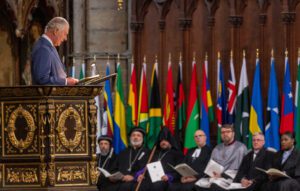ABOVE: Butaritari, Kiribati – Islands in the Pacific are particularly venerable to the effects of climate change. Photo Credit: KevGuy4101
What does ‘climate justice’ mean for Pacific Islanders? This was one of the main questions the Foundation aimed to understand with colleagues in Fiji, Tonga and New Zealand earlier this year. Because of climate change’s cross-cutting impact on people, society and livelihoods, our small delegation met with a range of actors: leaders of civil society organisations, writers and other creative practitioners as well as staff of government agencies and academics working on climate change adaptation (CCA) and disaster risk reduction (DRR) programmes.
The immediacy of the impact of climate change to Pacific Islanders was clear after my first few meetings. It is happening right now – yesterday. Coastal communities in Fiji have already been relocated due to sea-level rise, with many more communities on the list. Many of the legal ramifications related to relocation such as title and ownership rights, and compensation have yet to be worked out. Some of the existing information on land ownership is ambiguous and if title deed goes way back, perhaps doesn’t exist.
The situation of Kiribati is particularly dire. Kiribati occupies a total territory of 370km, but of that, 2% is land – low lying coral atolls; the rest is sea – its EEZ or Exclusive Economic Zone. Kiribati’s main economic industry is its tuna fishery. At current emissions rates and sea level rise, Kiribati predicts that many of its islands will be under sea by 2080 and they would be uninhabitable well before then. The Kiribati President has already sanctioned the purchase of land on Fiji to relocate the entire Kiribati population of 100,000+ people. If this happens, it would be the end of a sovereign state due to climate change. Another dilemma facing the nation of Kiribati is how to secure continued access to its tuna fishery for the economic and social development of its people. However, because the Law of the Sea states that the EEZ is determined by distance from land it is unclear what will happen to its EEZ if the land is underwater.[1]
“The immediacy of the impact of climate change to Pacific Islanders was clear after my first few meetings. It is happening right now – yesterday.”
For people whose link to the land is closely tied to their livelihood and identity, relocation could have far deeper ramifications. Fijian writer, Mary Rokonodravu, shared her concerns with me on the lack of attention given to the social and cultural implications of relocation. She referred to the historic case of the displaced people of Banaban from whom we could learn many critical lessons on the complexities and pitfalls of relocation. Back in 1945 when the island of Banaba was mined of its phosphate resources by the British Pacific Phosphate Company, the Banabans were forcibly relocated to the island of Rabi over 3000 km away. The provision for their re-settlement and adjustment to an entirely new environment and lifestyle was inadequete, leading to high levels of poverty.[2]
The response from the international community towards the impacts of climate change on Pacific islands has been to put vast amounts of financial support into the Pacific Islands for adaptation and risk reduction. Most of the bilateral and multilateral donors have funded large scale projects. This has created a highly complex landscape of agencies, donors and projects spending significant amounts of money, particularly at the regional level – so much so that those working in the sector seem fatigued by the complexity of the landscape. While there is immense capacity for the technical aspects of implementing CCA and DRR in the regional hub-countries, there is equally enormous and growing demand. The Green Climate Fund, which will bring millions in funding, will bring additional challenges for delivery.
The dominant narrative of climate change has therefore become climate change adaptation and risk reduction. Civil society, for the most part, has also had to frame its participation in the climate change response within the narrative of adaptation. However, none of the funding available from the main climate change adaptation funding pots is available to civil society. According to Krishneil Narayan, Coordinator of the Pacific Islands Climate Action Network (PICAN), currently no civil society organisation from the Pacific, arguably the region most impacted by climate change, is involved in the Global Climate Fund Board – or as observers, where decisions and assessments are made on what will be funded nationally. So even where Pacific civil society could help influence the adaptation agenda and to determine how funds might be spent for the potential benefit of vulnerable communities, they are excluded from the decision-making table. Pacific civil society seems confined to the ‘consultation’ box for adaptation programmes and CSOs viewed as deliverers for climate change awareness projects.
“The narrative of adaptation and risk reduction is ‘crowding out’ the space for questioning the inevitability of climate change.”
Coastal communities at the frontline of climate change impacts undoubtedly need support for adaptation. But where is the discussion of climate justice? Although climate justice is not a static concept and still evolving, a crucial aspect is the discussion of systematic transformation to tackle the root causes of climate change. But within this dominant narrative of adaptation and risk reduction, the inevitability of climate change becomes accepted. The narrative of adaptation and risk reduction is ‘crowding out’ the space for questioning the inevitability of climate change.
In addition, the space for solutions is limited to those with geopolitical and financial power and transformative change becomes obfuscated. In discussing the case of Kiribati, one of the technical staff at the Pacific Islands Forum Secretariat said something that stuck in my mind. Rather than focus on relocation, support should be on development – so that Kiribati has the prosperity to make innovative solutions and be resilient to the changes ahead. However, within the current framework of climate change adaptation and relocation, those on the frontline become portrayed as always in need of humanitarian relief – needing to be helped rather than as co-creators of the solution.
So, what does climate justice mean for Pacific islanders? I wasn’t convinced that the question of ‘justice’ which challenges and advocates for transformative change of fossil-fuel based, consumption-hungry economies was foremost on the minds of civil society. However, what I did find was that civil society in Tonga were challenging the dominant narrative of adaptation and risk reduction in another way. They were considering the response to climate change not as an adaptation question but as one of resilience and ‘green growth’. Although it is still early days and small scale, for Tongans, green growth means building prosperity for people in Tonga through the sustainable use of their resources.
In November 2016, in a meeting organised by the Civil Society Forum of Tonga (CSFT) and the Oceania office of the International Union for the Conservation of Nature (IUCN), Tongan government representatives, civil society and regional organisations identified seven principles of a green growth strategy: (1) development (2) justice (3) dignity (4) earth integrity (5) inclusion (6) governance (7) resilience (8) efficiency (9) inter-generational. Enhancing Tonga’s organic agriculture and the productivity of its fisheries through the protection and management of critical fisheries habitat are some of the first steps to realising their vision. A proposed local governance structure to establish structures and processes for a resilient governance arrangement is also being trialled. The challenge however is ensuring that green growth doesn’t just remain a niche but that it becomes the driver of the national adaptation response.
Studies have already shown that despite the commitments made by industrialised countries at the UNFCCC’s Paris COP21 in December 2015, to do all they can to limit temperature rise to 1.50C, just burning fossil fuels from projects presently in operation will produce emissions that will put the globe well past 20C of warming this century. Fiji is the chair of the next COP23 to be held in Bonn, Germany. Pacific civil society already see this as an opportunity to raise the profile of the climate change struggle in their region[3]. But will the issue get the attention it deserves? Can the stories of relocation and loss in the Pacific Islands help promote a more meaningful conversation from mainstream media in countries of the Global North about transformational change? Or will it reinforce perceptions of humanitarian need and climate change inevitability in current mainstream media discussions?
The Suva Declaration[4] prepared by PICAN and taken forward by the Pacific Islands Development Forum prior to the Paris COP21, is perhaps one of the clearest statements of asks from civil society and Pacific Island governments targeted at industrialised countries. But in addition to the asks, the narrative also needs to change. To do this, civil society needs to build its constituency to shape people’s world view. This is a challenging task across the islands of the Pacific, but it’s something that PICAN has begun – to strengthen its network of civic voices across the frontline countries of Kiribati, Tuvalu and Fiji. Linking with other networks and movements in high CO2 emitting countries, who are putting pressure on their own governments for systemic change, will help to build their power, influence public discourse and change the narrative from a discussion around adaptation to one of systemic change.
[1] For more on this, see: https://www.ted.com/talks/anote_tong_my_country_will_be_underwater_soon_unless_we_work_together
[2] See more: http://voices.nationalgeographic.com/2015/10/14/our-heart-is-on-banaba-stories-from-the-forgotten-people-of-the-pacific/
[3] http://www.fijitimes.com/story.aspx?id=391260
[4] http://pacificidf.org/wp-content/uploads/2013/06/Suva-Climate-Declaration-final_USB.pdf








